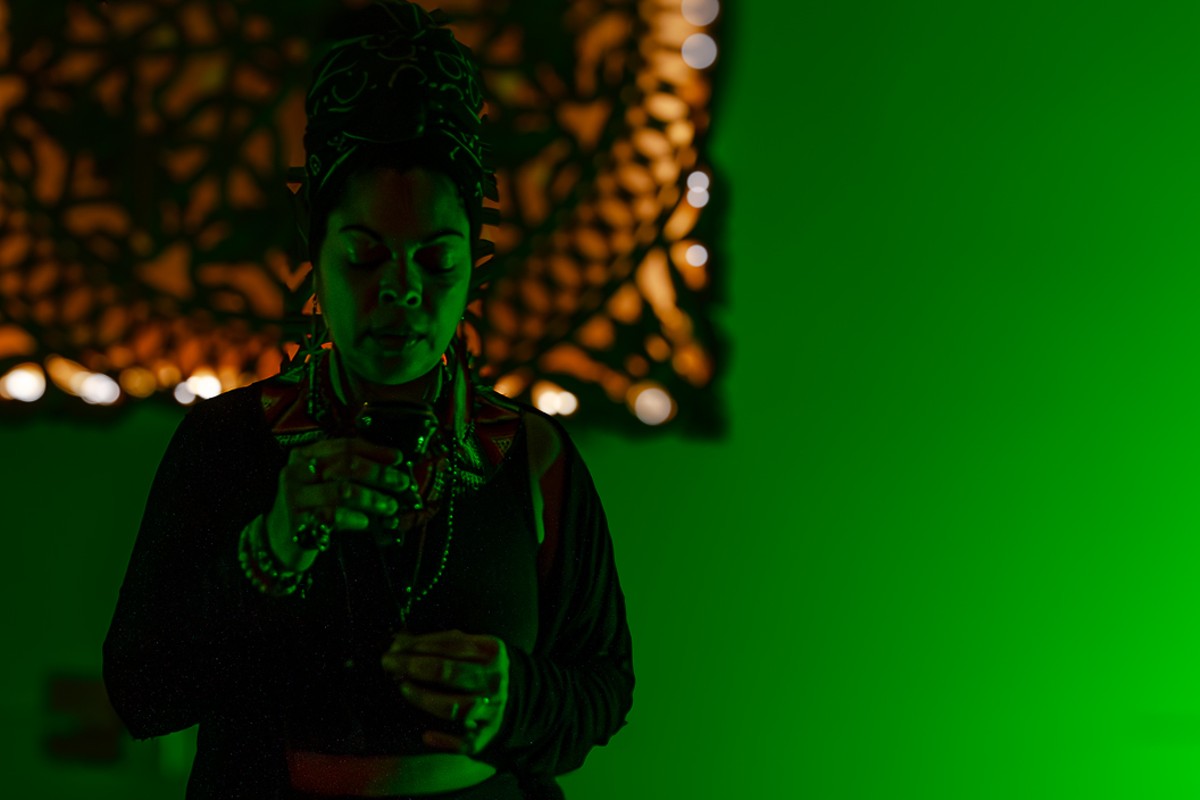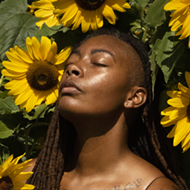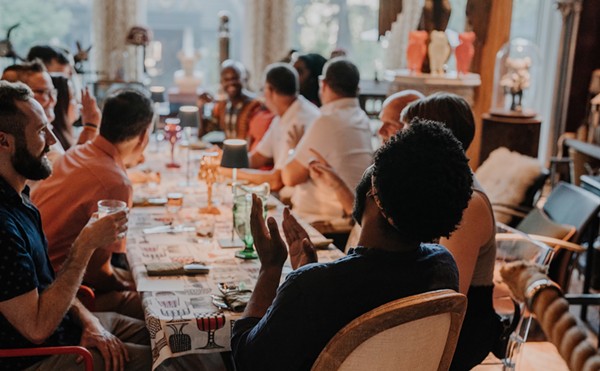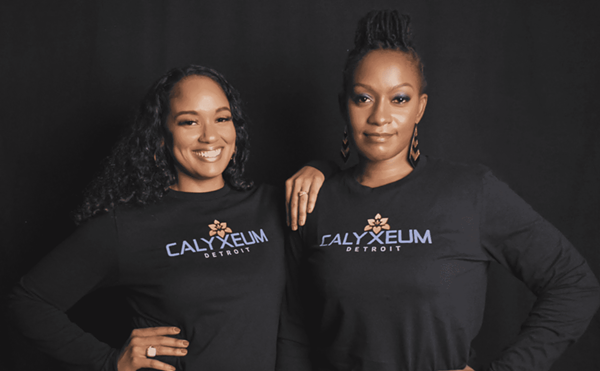Nydia the Ganja Clergy has tried pretty much every religion out there in search of a deeper connection with the divine. She’s been baptized as a Catholic, a Seventh-day Adventist, and by several different sects of Christianity, but none of them made as much sense to her as cannabis.
Where she found hypocrisy in other religions, in cannabis she found acceptance.
“She don’t judge. The smoke doesn’t care. She’ll anoint and bless you regardless,” Nydia says, personifying cannabis as female. “You know that hypocritical nature that a lot of these churches have? It’s like, ‘Do unto your neighbors as you would do unto yourself. You know you’re gonna die of sin, right?’ Like, what the fuck? Cannabis doesn’t have that voice. Cannabis tells you it’s OK.”
Nydia offers monthly “religious cannabis ceremonies” in metro Detroit where she invites people to foster a deeper connection with both the plant and themselves.
At a January ceremony, an altar of roses, selenite sticks, white candles, and chunks of quartz sits in the middle of a dimly lit room encased by a circle of black beans. “Divine love flows through every cell in my body,” a recording of mantras says on repeat as we settle in. “Perfect health is my divine right and I claim it now,” it continues. “I am healed now.”
During this “9 Puff Ceremony,” Nydia leads us through a journey of smoking and breathwork as we take an increasing number of puffs — three for the third round, four for the fourth, and up to nine — before settling into a sound bath where she asks us where we feel certain emotions in the body.
We call in the directions of North, East, South, and West and salute Father Sky and Mother Earth before lighting our joints like a stick of incense, allowing the smoke to purify our bodies. The counting starts from zero.
“Zero is a profound concept that embodies immense potential, infinite possibilities, and the state of existence before transformation occurs,” Nydia explains. “It’s the nothingness. It represents the delicate balance between life and death, encapsulating the very essence of creation from nothing.”
Elaborating on a phone call after the ceremony, Nydia explains that “Zero is pure creation energy. As humans, we have this concept of life and we see it as this timeline [where] the first thing is the beginning. And then you have life and then death. I see it totally different. I see death, I see creation, I see birth, and then I see life.”
“Cannabis allowed me to step into my divine feminine. ... Growth, that’s exactly what cannabis is about.”
tweet this
Nydia is a certified death doula, reiki practitioner, qi-gong teacher, and former physical therapist, in addition to being an ordained cannabis clergy.
In her search for connection, she says she first became an ordained clergy “in two minutes for $25” from the non-denominational Universal Life Church online. Then she found her mentor Micheal Myers (no, not the villain from Halloween) who was offering ganja clergy certifications.
“It involves practicing, believing, documenting, and declaring that cannabis is your sacrament and you use it to commune with the higher spirits or whatever god you believe in,” she explains. “When I found the clergy [certification] and understood that using this plant as my sacrament and being able to weave in and out of history and religions, and spiritual practices, and rites, that that was my mine as well as anybody else’s who decided to declare this as their plant, I knew that this is what I had to do.”
Nydia found herself drifting away from traditional religion and into the arms of cannabis due to what she calls “profound religious wounds” including an exorcism at the age of 14. Now she finds these religions as hindering most people from reaching their true potential.
“This became my unconventional rite of passage, an experience I can be grateful for after healing from it but a rite I received nonetheless,” she says about the exorcism. “The collective has been largely wounded by this new-age religion we call Christianity and the patriarchal values that evolved along with it. Stories of our past collective coming-of-age practices, rites, and traditions have largely been removed from our storybooks and oral traditions and replaced by shopping, secular holidays, [and] with scarcity mindset pushing everyone along into mental slavery.”
The nine-puff experience feels like a psilocybin ceremony except with weed, and it sort of is. Nydia adopted it from a ceremony she participated in at the Detroit Psychedelic Conference led by Mikaela de la Myco, where attendees took nine sips of the psychoactive mushroom amanita muscaria.
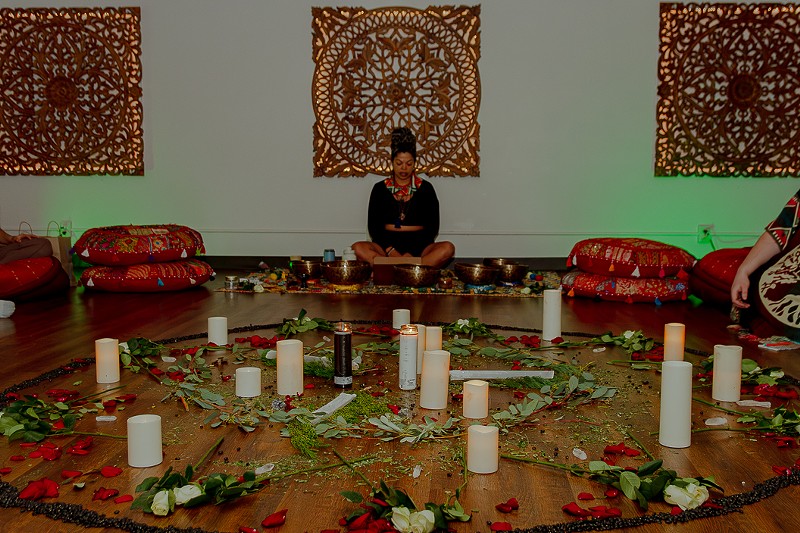
The room quickly fills with smoke by round two.
“The number three represents the maiden, mother, and crone, or mind, body, and spirit,” Nydia tells us, reminding us that we can stop smoking and just take the breaths if we’ve reached our limit. We end up taking 45 puffs by the end.
“The number six represents self-acceptance,” she says as the guy to my right sounds like he’s going to cough up a lung.
Laughter is highly encouraged, and unavoidable, as we’re all high by the end, but everyone is sunken into a silent state of bliss by the time we finish the 45 puffs and go into a guided meditation.
Nydia goes by Ganja Clergy but also “Kishar Assyria Sumer Ezizi Du Anatu,” a spiritual name she was given by Mistress Mehmuna Melchizedek during a twelve-week program on sacred femininity. It involves self-love practices like lighting a candle and staring at yourself naked in the mirror for 20 minutes, she tells me. The name means “goddess of the underworld who walks from ancient lands and protects the spirit of fire.”
“Cannabis allowed me to step into my divine feminine,” she says. “ I always thought divine feminine was this flowy, sexual, sensual woman who’s always nurturing and kind but [cannabis] allowed me to see that my divine feminine is dark. We grow in darkness. Plants grow in the dark. Growth, that’s exactly what cannabis is about.”
Azmera Elena Abai Masdegu Lelochi Itege T Aytiu, another student of Mistress Mehumna’s and a fellow Ganja Clergy, is helping take care of participants during the cannabis ceremony. Her name means “empress of the Nile River whose harvest holds the light that nurtures others.”
A registered nurse for 14 years, Azmera got into the healing properties of cannabis after using it for pain from nine back surgeries she endured after being hit by a drunk driver in 2013. The first surgery had failed, and after complications with subsequent surgeries, her doctors realized she was allergic to the titanium rods they had placed in her body. To deal with the extreme pain, her doctors prescribed her a series of opioids, which she didn’t like taking.
“After I had the last back surgery in October of 2018, I started looking at what cannabis could do because I left the hospital with 120 Percocet and after those ran out they gave me Norco and Gabapentin,” she says. “I took myself off the medication and started doing cannabis regularly.”
Before her own health struggles, Azmera was a caretaker for her sister who passed away from cancer in 2013. She remembers convincing her sister to try cannabis to help with her appetite.
“My sister smoked a joint with me one day, and when I tell you when we smoked that joint, I cooked her everything in the kitchen,” she says laughing. “She wasn’t eating at that point. I would take her food and it would just sit there. They were giving her Marinol pills to get her appetite up, but they didn’t help. So I said, you know what, let’s smoke a joint, and she asked for a pork chop [and] I made her a smoothie. I was shocked. It helped.”
Azmera also tried to convince her mother, who had cancer, to try cannabis but she was resistant because of the stigma attached to being a pot smoker.
“I feel like approaching it spiritually makes people more comfortable,” she says. “If you go back and look you’ll see that this is something that’s been around for thousands of years, and it’s been used in thousands of healing practices. And why did we stop? Because the government came in and couldn’t get their money? I don’t know, but why did we stop this natural way of healing?”
The cannabis ceremonies cost $77 and are held monthly at an undisclosed location. Each month has a different theme and the next one is a goddess ceremony on February 2. March’s ceremony will revolve around the story of Kali and Shiva from the Hindu tradition.
Nydia’s goal is to end the stigma of cannabis consumption for people of all faiths and to take the ceremonies to cities beyond Detroit by 2025.
“By the time I die, I want to see the rows of corn and wheat replaced by hemp plants,” she says. “I need people to understand how valuable of a resource this plant is and I need the industry to understand they are standing on the back of a religious sacrament. This industry took a sacred plant medicine and they’re moving it like alcohol just like they did with tobacco.”
She adds, “I want people to know, no matter what their faith is, whether they are Christian, Jewish, whatever, they should not be ashamed of their consumption. For god’s sake, they have an entire system in their body that interacts with this plant.”
More info can be found at her website, urwellnessllc.com.
Subscribe to Metro Times newsletters.
Follow us: Google News | NewsBreak | Reddit | Instagram | Facebook | Twitter

